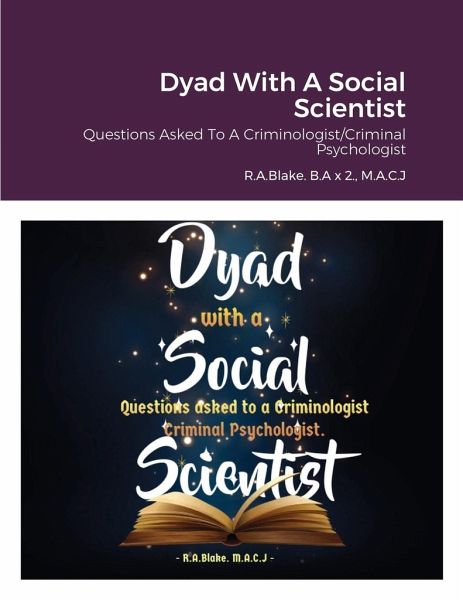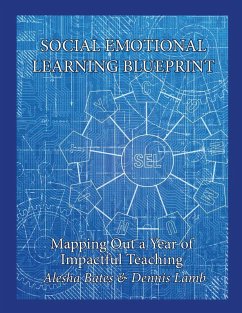
Dyad With A Social Scientist
Questions Asked To A Criminologist/Criminal Psychologist
Versandkostenfrei!
Versandfertig in 1-2 Wochen
23,99 €
inkl. MwSt.

PAYBACK Punkte
12 °P sammeln!
Preface This book is not your typical Social Sciences book. Instead of breaking up the book in field and subject chapters, I decided to break the book up into questions. These are questions that upcoming Social Scientist, especially those within Criminology, Psychology, Criminal Justice, Criminal Psychology and Forensic Psychologist will face. Each question lists all the references used to answer the question asked. This is in contrast to common social sciences books which list all the references at the end of the book. I did the opposite,as to avoid you having to search all the way to the bac...
Preface This book is not your typical Social Sciences book. Instead of breaking up the book in field and subject chapters, I decided to break the book up into questions. These are questions that upcoming Social Scientist, especially those within Criminology, Psychology, Criminal Justice, Criminal Psychology and Forensic Psychologist will face. Each question lists all the references used to answer the question asked. This is in contrast to common social sciences books which list all the references at the end of the book. I did the opposite,as to avoid you having to search all the way to the back of the book to see the supporting evidence source. Just skim or read to the end of the question and answers and all supporting evidence will be listed there. Each question page number is listed for easy index search. When there are more than one question, ask within a scenario, it will be mentioned and those pages also will be highlighted. This allows you to find the exact information you are seeking, and a particular topic or subject. These are a collective of questions asked over a 10 plus year span. This will make for a large and maybe heavy book to walk around with. To ease that issue, this series is divided. This is the first of the series and this book will not pass 100 pages. The Next installment will be similar and it will carry on in this format. Snippets from: Marxist Theory -The Compressed Version. "In modern society, conflicts between the upper and lower classes can be found visible in social organizations and Institutions. Such as schools, universities, and the workplace, healthcare, and the criminal justice system. Neo-Marxist has a more realistic approach and the notion that history knows and will continue to produce & usher in an unfamiliar economic order time and time over. Whilst another Marxist criminologist may consider that an overturning of the ongoing capitalist mode of America or Britain is the solution." Snippet from: So, as a community development practitioner. "Tills' (2011) definition corresponds with McGregor's 1960 theory on how to manage and lead a staff. 'Theory Y' as he coined it, expectation states all workers have the capacity to work as a team and that individuals are not opposed to the ideas being considered. Highlighting that it is up to the leader (stakeholder) to produce a safe and welcoming working condition. By doing so, it encourages the employees and leaders to collectively attain their personal goals..."





![WHEN SCIENTIST PRESENTS [W/ DVD] Cover WHEN SCIENTIST PRESENTS [W/ DVD]](https://bilder.buecher.de/produkte/26/26120/26120615n.jpg)

![WHEN SCIENTIST PRESENTS [W/ DVD] Cover WHEN SCIENTIST PRESENTS [W/ DVD]](https://bilder.buecher.de/produkte/26/26166/26166147n.jpg)






